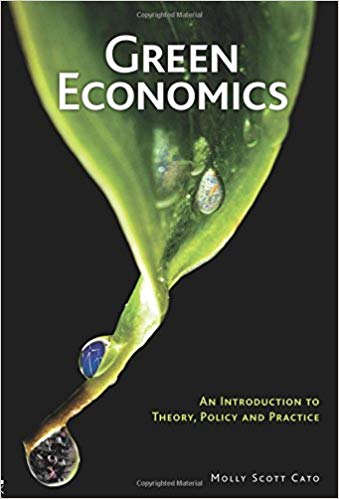In this presentation of this interesting book, Molly Scott Cato, highlights the importance of the awareness of issues relating to sustainable development and why we are obliged to address it with urgency as it threat our existence.
he says in the introduction to his book :
As I have been writing I have come to think of this book as a scrapbook – or
perhaps, in a book that concerns itself with a whole range of ways of provi-
sioning and is particularly interested in those that do not involve the market, I
should say that I have become a hunter and a gatherer. I have had to hunt
down obscure books and writers who have been neglected by the mainstream. I
have gathered up their insights and offer them here for your consumption. Of
course all books draw widely on other sources in presenting a case, but this
book is more like a collection of ideas and evidence drawn from the many
writers who have contributed to this developing field – often without identify-
ing themselves as green economists. I have been responsible for the selection
and for the thread that runs through the work, but this is not a work of origi-
nal or creative writing.
What has inspired me during the writing has been the growing admiration
for the huge oeuvre that has gone unnoticed by policy makers and the general
public. This is partly our own responsibility as green economists. We are a
somewhat media-shy and gnomic bunch, lurking in dark corners burnishing
our gems but not exposing them to enough light. Many of the people whose
work I cite in the following chapters are colleagues; many are also friends.
While it has been an enjoyably cosy adventure thus far, I think it is time that
this work was taken beyond the charmed circle. I hope the following chapters
will give you a taste for what green economics is all about; however, there is
not enough space to do more than that. In Chapter 13 I provide a summary
and lists of resources for taking your interest further.
The book begins with some history of green economics ideas to give a
grounding to the discipline. For me it is important to know where we have
come from, but if your concerns are more with the proposition and policies we
are offering, you could go straight to Chapter 4. You will notice that there are
contributions from politicians and campaigners as well as academics through-
out the book. In Chapter 1 I discuss the way that green economics has grown
up from the grassroots in response to identifiable social and environmental
problems. This is why the nascent discipline is enriched by the contributions of
those outside the academy.
There is little doubt that we face a major environmental crisis for which
traditional solutions appear useless. I am so glad to be able to share with you
the fruits of the labours of so many dedicated men and women over the past 30
years or so. It seems to me that most of the answers we need are here. Please
share them, build on them and, most importantly, act on them.
Molly Scott Cato
Stroud
June 2008
To buy this book ,please try its link ,through amazone ,as follow :


















